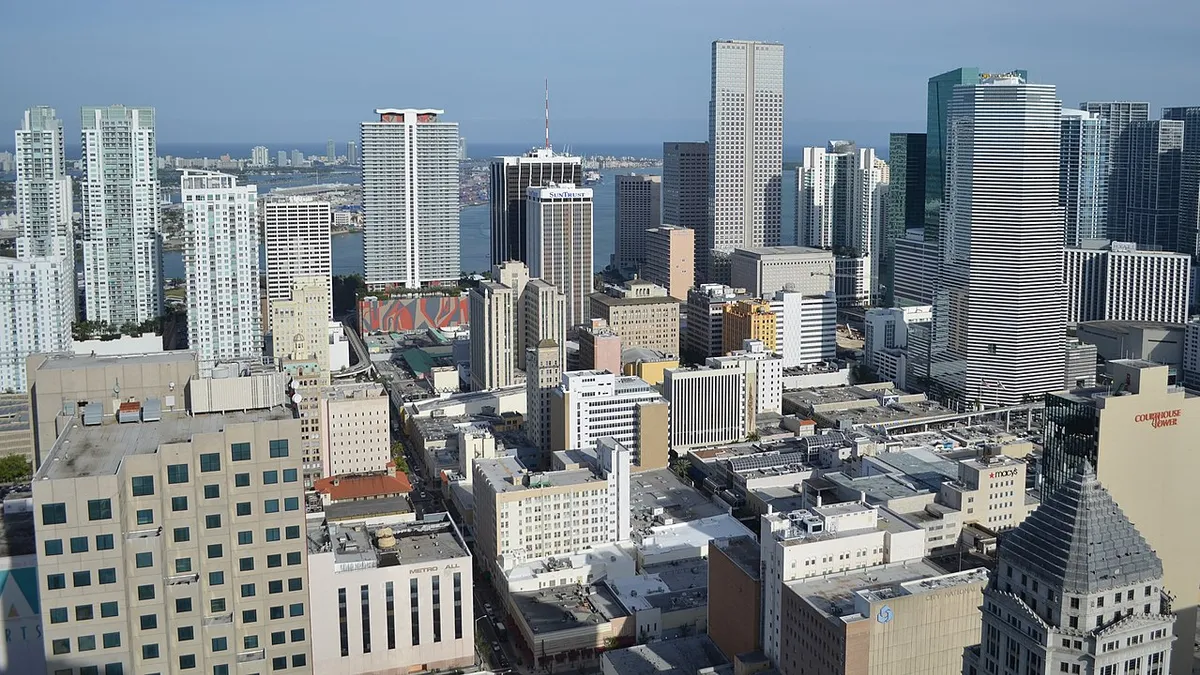Dive Brief:
- Renewable energy services company Arcadia Power has released data that ranks the energy efficiency of customers in 15 major U.S. cities. Miami, Los Angeles and Atlanta ranked as the least efficient, and Chicago, New York and Denver were the most efficient.
- Arcadia claims that the cities most at risk of feeling the effects of climate change are the least energy efficient.
- The survey was based on information gathered from 7,400 Arcadia Power customers living in the 15 cities, according to the Miami Herald.
Dive Insight:
Arcadia's study referenced a research report that appeared in the journal Science last year, which showed the estimated climate change damage that all parts of the United States can expect between 2080 and 2099. Warmer locations in the South are predicted to have the most damage while cooler locations in the Northeast and Northwest the least.
While the call for more efficient energy use in Arcadia's study is valid, its claim that cities most at risk of climate change are the least efficient might be a bit of a stretch. Several factors make the company's claims less impactful than other bona fide scientific research on climate change and energy use.
One sticking points lies in the fact that the data were solely gathered from Arcadia Power's customers, which is a very limited sample. The data would be more representative of actual energy use if it covered a random sampling of all residents in the chosen cities.
Along those lines, Arcadia is an electricity broker but not all residents across the country use electricity for climate control. Although electric air conditioners are indeed the primary manner of cooling homes, some cold weather cities in the survey also rely on other energy sources for heating, such as natural gas. That could skew the data for the cold weather cities because it would appear that they're using less energy when in fact they're just using a different energy. Therefore, it's difficult to definitively say, for example, that New York City residents are more energy efficient than those in Miami based solely on the data gathered for this survey.
Another thing to consider is that this data shows the opposite of what some other scientific research has found about energy use in certain parts of the country. Another study that looked at climate control in the warmest and coolest large metropolitan areas in the U.S. — Miami and Minneapolis — discovered that cold areas are more energy demanding than hot areas. This is not to say that one study is absolutely right and the other is wrong, but it does indicate that many factors should be considered and speaking in absolutes about this type of energy use is tricky.
Arcadia's points about the need for better energy efficiency to mitigate the effects of climate change are well taken. Miami is frequently referenced in climate change discussions not just because of its sweltering temperatures creeping up, but also because of its susceptibility to rising sea levels. The flooding is already being experienced with the spread of "king tides" regularly flooding streets in South Florida.
Because of these concerns, it would make sense for residents in Miami to be more tuned in to climate change and their contributions to it than people living in other parts of the country. With Miami residents' average monthly energy usage through Arcadia Power coming in 25% higher than the company's customers in other cities, it could be a wake-up call and prompt some people to re-examine their energy consumption.
Arcadia's analysis also offers the following thought: "Fast-paced city life can leave little time for thinking about your energy efficiency. But there are simple steps that you can take every day to improve your home efficiency, without impacting your quality of life." It suggests commonly used tactics for reducing energy consumption such as switching to LED light bulbs, unplugging appliances when not in use, doing laundry at off-peak hours and installing a smart thermostat.












